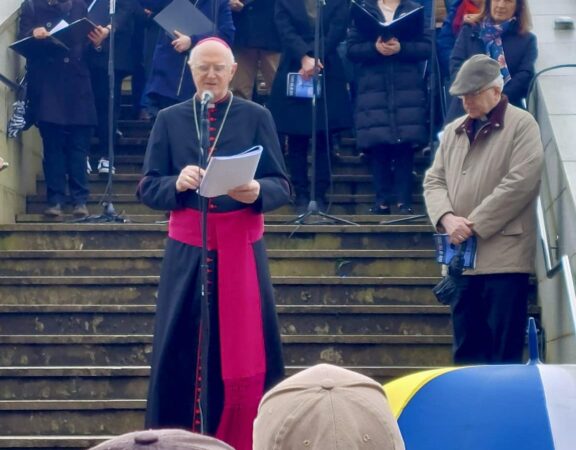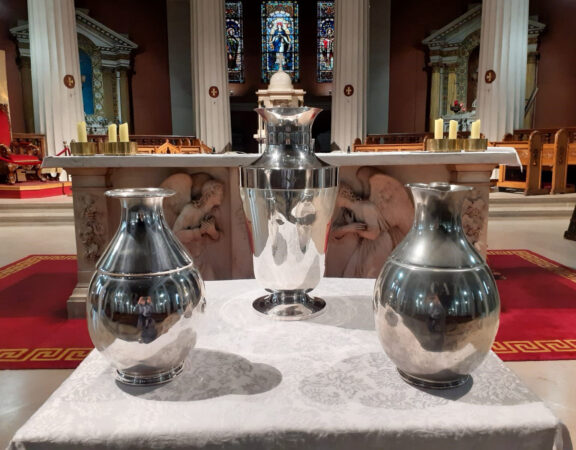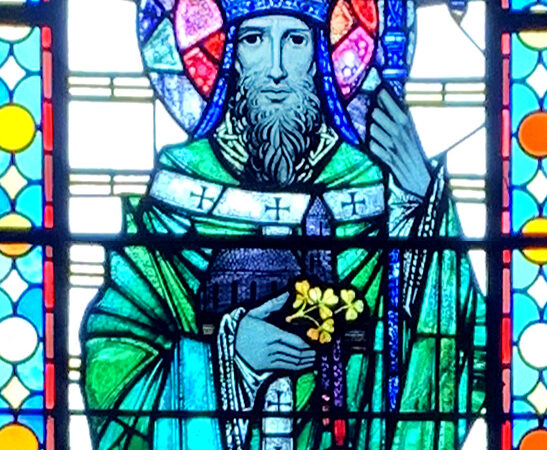Saint Patrick’s College, Drumcondra MASS FOR THE OPENING OF THE ACADEMIC YEAR 2013
Homily Notes of Most Rev. Diarmuid Martin Archbishop of Dublin
Saint Patrick’s College Church, 17th October 2013
The different Gospels tell the story of the call of the apostles – and thus of the origins of the Church – in different ways. For Saint John, from whose Gospel we have just heard, the call of the first disciples is presented at the very beginning of the Gospel, at a time in which the preaching of John the Baptist is still taking place. Indeed in Saint John’s Gospel it is John the Baptist who points out Jesus to the first disciples, rather than Jesus calling these disciples directly.
The disciples then go to Jesus himself and they ask the question: “where do you live”. Even today when we ask someone “where do you live” we are really asking something more. We are indirectly asking: “who are you?”; “tell me something more about yourself?” Jesus asks these two disciples to come with him and instead of finding an identified place or a building, they encounter a teacher. They encounter a man who in his dialogue with them changes them and convinces them that he is someone extraordinary; indeed he may even be the Messiah.
Next morning, one of the two, Andrew, brings his brother Peter to Jesus and immediately a special bond between Jesus and Peter springs up. Jesus gives Peter a new name – Cephas, the rock. That Jesus gave Peter a new name is one of the most certain details in the New Testament. All the Gospels recount the giving of the name and on various occasions when Peter is listed in the Gospels, that special name is mentioned.
Who then is Peter and what does giving him this name tell us about Jesus’ plan for carrying on his mission, not just locally at that time in Galilee but for spreading his name and his message around the world.
Let us look at Peter. Peter is the rock, even though we know that solidity was not one of his immediate natural aptitudes. Peter was both impetuous and weak, but there was always about him a real affection and loyalty to Jesus. He grappled with what faith was about and he grappled between certainty and doubt in his estimation of the truth of who Jesus was. This man of uncertainty was the man Jesus chose as the rock.
The certainty of faith is different to the certainty of science. For many men and women today the only truth they recognise is that of technology: truth is what we succeed in building and measuring by our scientific know-how. This – it is said – is the only kind of truth that can be shared and can serve as a basic for common undertakings.
But we know also that there are other expressions of truth. There is the truth of relationships: the truth of loyalty, of love and of commitment which is central to the personal life of us all. There is the truth of ideals and the dreams, which though not verifiable technologically or scientifically, is what has often actually changed the world.
Truth is not then just about measurement and investigation. It is about who we fundamentally are. The truth we must seek is a truth which attempts to comprehensively explain our life as individuals and as a society.
What can we say about the certainty of faith? The first thing to note is that God is other. God is gift rather than something of our creation. A God of our own creation is no longer God, but a projection of our own inadequacies and false certainties. Faith in a transcendent God is a faith which, though not insensitive to the realities of the world, is not determined by them. Faith in God should free the believer from closed ideologies and narrow prejudice in order to be a constant seeker for truth. Faith in a transcendent God should lead the believer to realise than he or she has never attained truth in its fullness. The believer must be as much a doubter and questioner as one certain of his own certainties. In that sense Peter is an image of what the believer is like.
Faith and the Christian life are therefore not marked by imposed uniformity and conformity. The second reading of our Mass reminds us of how the life of the Church is marked by the variety of gifts which God bestowed on humankind and on the Church, The reading is not just about a list of jobs or functions which have to be assigned in order to get thinks done within the community. These gifts are bestowed are bestowed for the good of the Church but they only work when they are bound together in love and where love is not a pretext but a love that is marked – as our reading notes – by profound respect for each other, by untiring effort and by great earnestness of spirit.
These attitudes are the characteristic of the life of faith in the Church. I might say as an aside to a student group of your age – if an old man like me can give you advice – that these words are also very relevant to-day-to day love of each of us. Any type of relationship of love will only be true and will only flourish if it is marked also by the same characteristics: profound respect for the other, untiring effort and great earnestness of spirit. True love is never a pretext or simply something narcissistic and self centred.
Let me leave aside my personal advice. Profound respect for the other, untiring effort and great earnestness of spirit are the characteristics of love which must mark every Christian. The reading goes further. The Christian community must be marked as well by hope and by sharing. It must be a place, the reading says, where we “make hospitality your special care”.
What does Christian hospitality mean? Living in a student community is a great opportunity and a moment of freedom in which you learn the link between freedom and responsibility. Being in College can be a wonderful experience, but not for all and not always. Academic life can bring with it stress and pressures. There can be great gregariousness and fun, and in the midst of that noise and diversion there can also be loneliness and isolation. Christian hospitality in your context means working to build a community of welcome, in which there will be a sense of keeping an eye out for anyone who is troubled or is going through a troubling moment and where there will be a real sense of solidarity and a hospitality which excludes no-one.
Peter, the rock, on whom Jesus was to build his Church was like anyone of us, sincere and yet ambiguous, disloyal, untruthful. Jesus chose as those who would bring his name and message to each successive generation men and women who, despite their failings, were people with their hearts in the right place, who allowed the power of God revealed in Jesus Christ to lead them beyond their own inadequacies and to follow the God who revealed himself as love.
My prayer is that this academic year will be for each of you a year of blessings; a year in which as individuals and as a community you will learn more of the life and the values that being a follower of Jesus opens for you. If you turn to Jesus and ask him, as those first disciples did,”where do you live”, he will lead you on journey with him, helping you overcome your own self-centredness. That journey will enable you to make the love a God a reality in your own lives, and through your lives touch the hearts of those around you who are anxious and troubled and those who seek the meaning and hope which only Jesus can guarantee.









